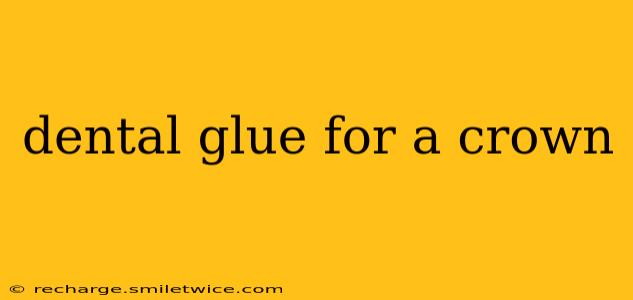Losing a dental crown can be a distressing experience, leaving you with discomfort and potentially impacting your ability to eat and speak properly. While many people automatically assume a dental adhesive is the solution, the reality is a bit more nuanced. This article aims to clarify the options available and guide you through the process of dealing with a loose or dislodged crown. We'll explore different "dental glues," addressing common questions and highlighting the importance of professional dental care.
What is Dental Cement, and How Does it Work?
Contrary to the common misconception of "dental glue," the substance used to secure a crown is actually a dental cement. This isn't a simple household adhesive; it's a specifically formulated material designed for the demanding environment of the mouth. Several types exist, each with different properties:
-
Zinc phosphate cement: A long-standing option, known for its strength and reliability. However, it can be irritating to the tooth's pulp (the inner part of the tooth).
-
Glass ionomer cement: Releases fluoride, benefiting tooth health, and it's generally less irritating than zinc phosphate. It's also less strong than some other cements.
-
Resin-modified glass ionomer cement: Combines the benefits of both glass ionomer and resin cements, offering a good balance of strength, fluoride release, and biocompatibility.
-
Composite resin cement: A strong and aesthetically pleasing option, often used for anterior (front) teeth because of its ability to match the tooth's color.
The cement's function is to create a strong, long-lasting bond between the crown and the prepared tooth structure. It fills the microscopic gaps between the crown and tooth, preventing bacteria from entering and causing decay or infection.
Can I Use an At-Home Adhesive to Fix My Crown Temporarily?
While the internet might suggest various household adhesives, we strongly advise against using anything other than a temporary dental cement recommended by a dentist. Superglue, epoxy, or other household adhesives are not biocompatible and can potentially harm your gums, teeth, and overall health. They are also unlikely to provide a secure enough bond for a crown. Using them can lead to further complications requiring more extensive and costly dental treatment.
What Should I Do If My Crown Falls Off?
If your crown falls off, the first step is contact your dentist immediately. They will be able to assess the situation and determine the best course of action. Before your appointment:
- Try to locate the crown. Keep it clean and safe, ideally in a container with a little milk or saline solution.
- Rinse your mouth gently. Remove any food particles or debris from the affected area.
- Avoid eating hard or sticky foods. This will prevent further damage to the prepared tooth.
- Consider using a temporary crown-covering material, like a small piece of dental wax (if you have it) or a cotton ball, to protect the tooth and prevent it from irritating your gums.
Is Dental Cement Permanent?
Dental cement used to secure crowns is designed to be durable and long-lasting, but it's not permanent. Over time, the cement can degrade, leading to loosening or even dislodgment of the crown. Regular dental check-ups are crucial for monitoring the condition of your crown and cement.
How Much Does it Cost to Recement a Crown?
The cost of re-cementing a crown varies depending on several factors, including your location, the dentist's fees, and the type of cement used. It is generally less expensive than having a new crown made. It's best to contact your dentist for a cost estimate.
How Long Does it Take to Recement a Crown?
The process of re-cementing a crown usually takes a relatively short time, often completed within a single appointment. Your dentist will clean the tooth and crown, apply the cement, and secure the crown in place.
Conclusion: Professional Care is Essential
While the idea of a simple "dental glue" might seem appealing, it's crucial to remember that dealing with a loose or lost crown requires professional dental care. Attempting to fix it yourself can lead to more significant problems down the line. Contact your dentist for proper assessment and treatment to ensure the long-term health and stability of your teeth. Remember, prevention is key; regular dental check-ups are the best way to identify potential issues early and prevent more serious problems.
